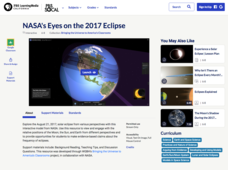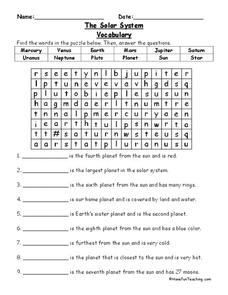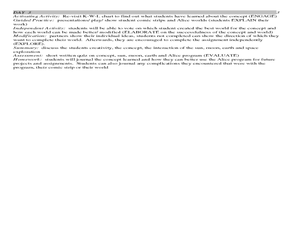University of Colorado
Distance = Rate x Time
Every year, the moon moves 3.8 cm farther from Earth. In the 11th part of 22, classes use the distance formula. They determine the distance to the moon based upon given data and then graph Galileo spacecraft data to determine its movement.
CK-12 Foundation
Clarke's Dream
How does satellite TV keep a steady stream when the earth and the satellite are constantly moving? Scholars use a simulator to adjust the radius of orbit of a satellite around the earth. They view graphs of acceleration and time period...
PBS
NASA's Eyes on the 2017 Eclipse
How did the 2017 eclipse look in Los Angeles—or Chicago? Experience both views, plus many more, using a lesson from PBS's Space series for middle schoolers. Scholars follow the movements of the sun, moon, and Earth during the most recent...
Curated OER
Get the Picture!
Astronomers practice downloading data from a high-energy satellite and translate the data into colored or shaded pixels. As a hands-on activity, they use pennies to simulate high-energy satellite data and they convert their penny...
Mr. E. Science
Erosion and Deposition
Get an in-depth look into erosion and deposition with a 23-slide presentation that details how gravity, water, waves, wind, and glaciers cause changes to the Earth's surface. Each slide consists of detailed images equipped with labels,...
NOAA
Satellite Communications
How do satellites communicate? What types of satellites orbit Earth? Discover and mimic the way satellites communicate between two points in a hands-on activity that has pupils using mirrors, flashlights, and marbles.
Curated OER
The Potential Consequences of Climate Variability and Change
Learners analyze the impact of climate variability and change utilizing a broad span of topics over a wide range of grade levels. This three lesson unit is easily adapted for the various instructional levels listed.
Space Awareness
Fizzy Balloons - C02 in School
Carbon dioxide is a very important gas; it is present in the air, used in cooking, and supports plant and animal life. Scholars investigate the properties of carbon dioxide with three different activities. They experience a color change,...
Curated OER
A Closer look at Oil and Energy Consumption
Upper graders analyze basic concepts about the consumption, importation and exportation of the worlds oil production. They create several graphs to organize the data and draw conclusions about the overall use of oil in the world.
Teach Engineering
The Amazing Red Planet
Introduce your class to Mars with a resource that provides information about its size, location, length of day, length of year, number of moons, and average temperature. Also includes is information about the lans for past...
Newspaper Association of America
Cereal Bowl Science and Other Investigations with the Newspaper
What do cereal, fog, and space shuttles have to do with newspapers? A collection of science investigations encourage critical thinking using connections to the various parts of the newspaper. Activities range from building origami seed...
Weber State University
The Sun and the Seasons
Why is there more daylight in June than in December if you live above the equator? How does the angle of sunlight shift throughout the year? Answer these questions and more with an interactive article about the sun, its path through the...
PBS
The Planets of the Solar System
Launch a lesson that's sure to capture middle schoolers' interest! Exploration enthusiasts examine the planets of our solar system using an activity from PBS's Space series. The resource includes images and information for each planet,...
Curated OER
The Land Around Us - Lesson 3
While the content of this instructional activity is more specific to the first grade, the directions given to work on a PowerPoint are well written. These directions could be used by anyone, with any content. Younger learners may need...
Curated OER
Making Models of the Solar System
Students make several models of the solar system to learn the positions of the planets in the solar system as well as relative distances and sizes. Creation of these models will help them identify the planets by size, shape, color,...
NASA
Exploring the Colors of Mars
Minerals on Mars are not that different than those on Earth. Using mineralogy concepts and satellite images, individuals use color to highlight the different surface minerals on Mars when creating a model of the planet. They enhance...
Curated OER
The Origin of Life
In this origin of life worksheet, learners write answers to five questions. They describe characteristics of the first life forms and how scientists believe oxygen accumulated in the Earth's atmosphere.
Curated OER
Lunar Learning
Students learn about the phases of the moon. In this moon phases instructional activity, students learn about what causes the moon to look different to us everyday and how the Earth and Sun's position determine what phase the moon is in.
Curated OER
Day and Night
Fifth graders investigate the Earth's rotation and revolution and the moon's orbit around the Earth. They participate in a class discussion about how night and day occur, and take notes. Next, they watch a video about the solar system...
Curated OER
The Solar System
In these space science worksheets, students find the words in the word search puzzle. Students then answer the nine questions about the planets.
Curated OER
Moon Shadows
In this moon shadows instructional activity, 3rd graders follow the directions to set up a demonstration about the sun, the earth and the moon.
Curated OER
Facts and Myths about our Solar System
Sixth graders explore popular ideas about the Sun and Moon. In this space science lesson, 6th graders separate commonly accepted details about our solar system into facts and myths. Students research a particular idea and...
Curated OER
The Earth and Beyond
In this solar system worksheet, students complete 2 activities that involve ordering the nine planets and correctly placing them onto a diagram.
Curated OER
The Tides
Students experience a computer based applet that explains why the Earth experiences tides.
Other popular searches
- Earth Space Science
- Space Science on Earth
- +Earth and Space Science
- Earth Space Science Quiz
- Inquiry Earth Space Science
- Space and Earth Science
- Spaceship Earth
- Seeing Earth From Space
- Earth and Space Sciences
- Earth and Space Experiments
- Earth and Space Technology
- Space and Earth























